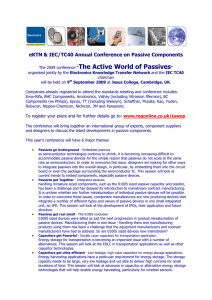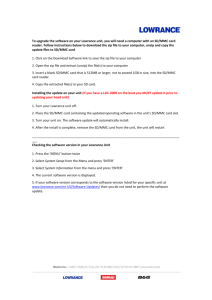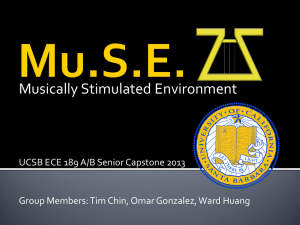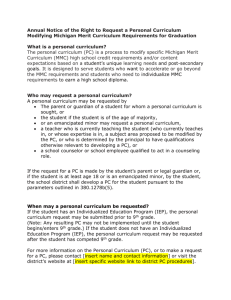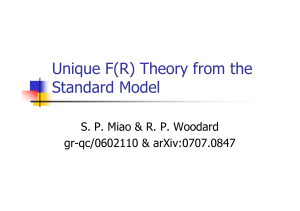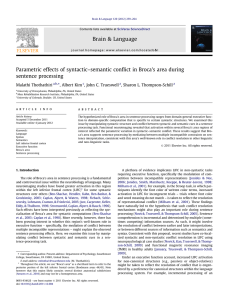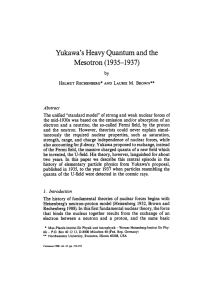Int. Quantum Fields in de Sitter Space Richard Woodard University of Florida
advertisement
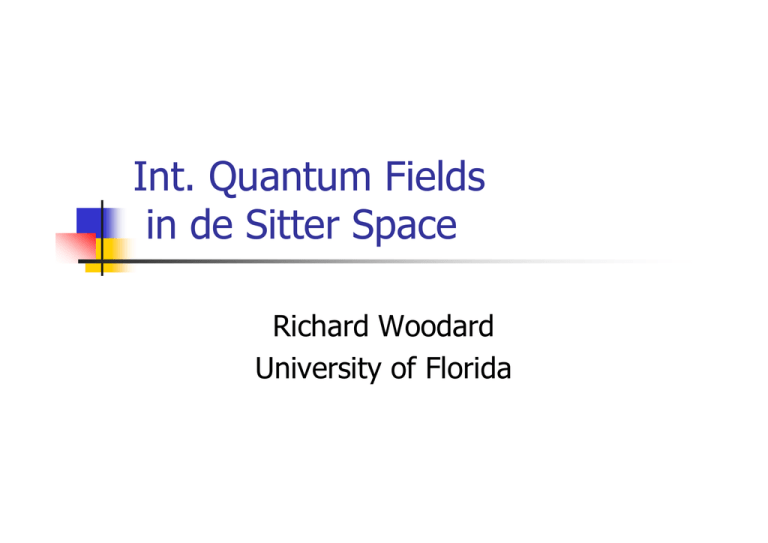
Int. Quantum Fields in de Sitter Space Richard Woodard University of Florida Why de Sitter? No sex to disrupt study! A paradigm for inflation 1. 2. 3. FRW: ds² = -dt² + a²(t) dx² De Sitter: a(t) = exp[Ht] Cool stuff happens! Spacetime Exp. Strengthens QFT Why? Maximum Effect for Loops classical physics of virtuals Expansion holds virtuals apart longer Inflation M=0 No conformal invariance (classically) Two Particles MMC scalars gravitons MMC Scalar Models λφ^4 (Brunier, 1. M²(x;x') ∆u(t,k) & <Tµν> Growing scalar mass & pos. vac. Energy SQED (Kahya, 2. Kahya, Onemli) Prokopec, Tornkvist, Tsamis) M²(x;x') ∆u & Π(x;x') ∆ε <φ*φ>, <(Dµφ)*Dνφ>, <FµνFρσ> & <Tµν> Growing photon mass & neg. vac. Energy Yukawa (Duffy, 3. Prokopec, Miao) M²(x;x') ∆u, Σ(x;x') ∆u & <φψψ> Growing fermion mass & neg. vac. Energy Quantum Gravity Models QG + Dirac (Miao) 1. Σ(x;x') ∆u(t,k) Growing fermion field strength QG + MMC Scalar (Kahya) 2. M²(x;x') ∆u(t,k) Possible tilt in Power Spectrum QG (Tsamis) 3. Σ(x;x') & <hµν> Consistent with relaxation of Λ Infrared Logarithms WHAT: factors of ln(a) = Ht in QFT results EG: λφ^4 1. 2. P = λ H^4[-2 ln²(a) - 4/3 ln(a)]/(4π)^4 + ... WHY: 3. <Ω׀φ²׀Ω> = H² [ln(a) + UV]/(4π²) (Ford & Vilenkin, Linde, Starobinsky, 1982) ∫_0^t dt’ 1 = ln(a)/H NB: ln(a)’s even in Power Spectrum 4. Weinberg, hep-th/0605244. How many ln(a)’s per coupling constant? ∆₤ = (c.c)(φ, hµν)^N (other fields) up to N ln(a)’s for each (c.c.)² 1. 2. λφ^4 ln²(a) for each λ SQED (eφ*∂φA & e²φ*φAA) ln(a) for each e² 3. 4. Yukawa (gφψψ) ln(a) for each g² QG (κh∂h∂h) ln(a) for each G H² The Perturbative Conundrum When lowest ln(a) loops go order 1 … 1. 2. 3. λφ^4 ln(a) ≈ 1/√λ SQED ln(a) ≈ 1/e² Yukawa ln(a) ≈ 1/g² QG ln(a) ≈ 1/GH² … ALL ln(a) loops go order 1! And perturbation theory breaks down. Leading Log Approximation Starobinskii’s Rules (astro-ph/9407016) Proof (with Tsamis, gr-qc/0505115) Generic Free Field Expansion φ= φ0 + λVφ³ = φ0 + λVφ0³ + λ²V²φ0^5 + ... = φ0 [1+λVφ0² + (λVφ0²)²+...] φ^N=φ0^N [1+λVφ0²+...] Hence each extra λ brings V φ0² One ln(a) from V One ln(a) from φ0² Infrared Truncations IR Truncated Yang-Feldman Non-Perturbative Solution Physics of competition Inflationary particle production pushes φ up Classical force pushes it back down Expect a static limit for ρ(t,φ) Cosmology is NOT an RG Flow Renorm. Group: xµ → A xµ Cosmology: dxµ → a(t) dxµ RG Cosmology: Replace A with a(t) WRONG for MMC scalar + λφ4 1. 2. 3. 4. RG for A ∞ is free a(t) ∞ is NOT free More General Theories Cannot Ignore Passives Passives can carry IR logs Eg. < F(x) F(x) > Actives interact through passives Eg. Quartic coupling Cannot Ignore the UV IR (H<k<Ha) vs. UV (Ha<k) IR logs only from IR of actives Effective ints from IR+UV of passives What to do? Integrate out passive Complicated Effective Action! IR truncate and simplify Reduces to Effective Potential Evaluate for φ(x) = const At L.L.O. each φ MUST contr. to a ln(a) So forget about space dependence Because passives are passive . . . Green’s functions give pos. powers of a’/a Nonperturbative Results for SQED <φ*φ> ≈ 1.6495 H²/e² M²γ ≈ 3.32133 H² M²φ ≈ .8961 ٠ 3e²H²/8π² ρvac ≈ -.6551 ٠ 3H^4/8π² 1. 2. 3. 4. Cf. a dielectric slab in a charged capacitor ≈-.2085 ٠ Λ/8πG ٠ GH² Small wrt Λ/8πG but HUGE wrt ρcrit And DYNAMICAL Conclusions Infl. + m=0 + no conf. enhanced QFT Starobinskii’s stochastic formalism MMC scalars and gravitons Effects manifest as factors of ln[a(t)] Gives leading IR logs for V(φ) models Can be summed for V(φ) bounded below UV doesn’t matter General models have passive fields Eg ψ in Yukawa Don’t cause IR logs but can carry them Also mediate interactions between actives Conclusions II Integrate out passives, then IR truncate Same as computing effective potential! Done for Yukawa and SQED V(φ) unbounded below for Yukawa! SQED φ reaches ~ H/e! IR logs DO NOT always sum to a constant Non-pert. confirmation of Davis, Dimopoulos, Prokopec and Tornkvist (PLB501 (2001) 165) Next up: Quantum Gravity


